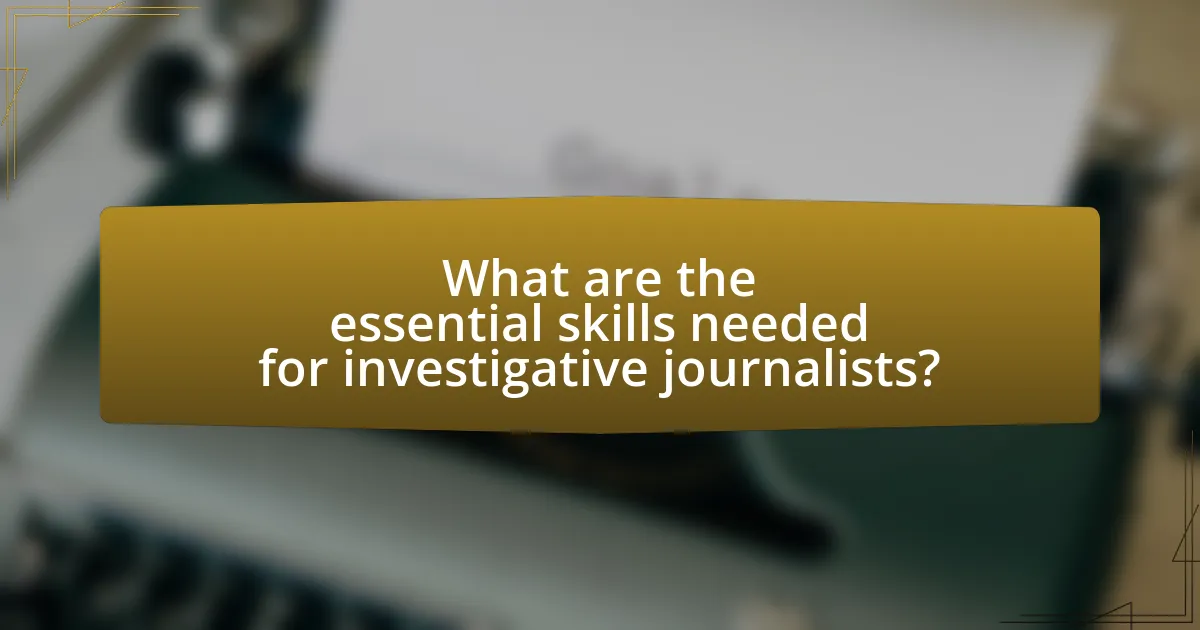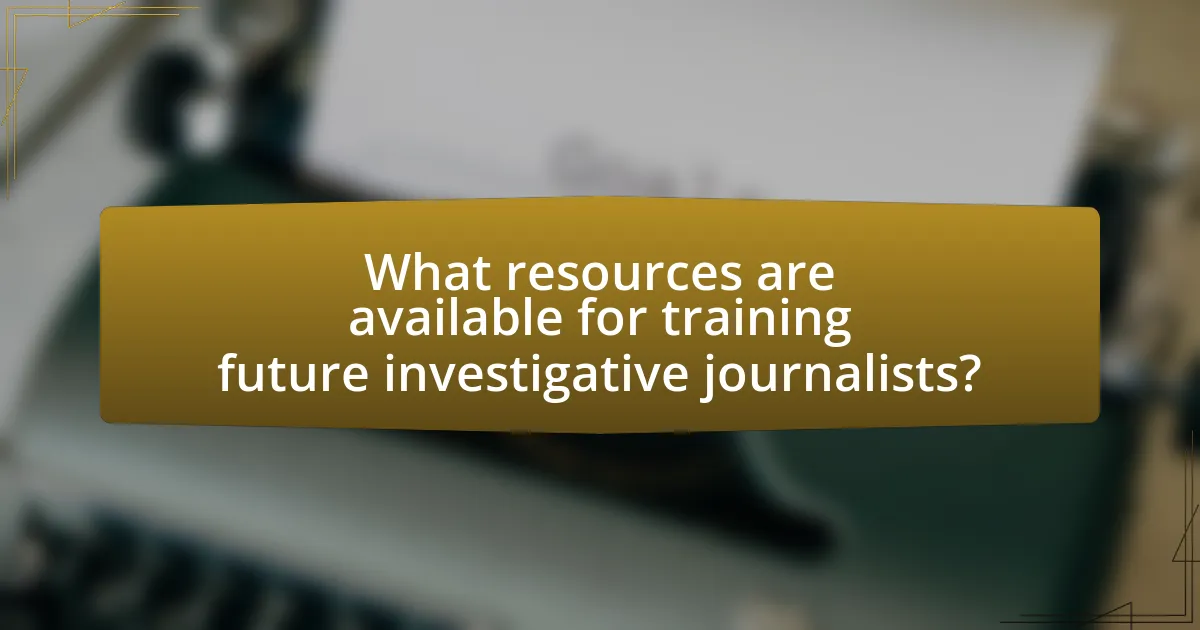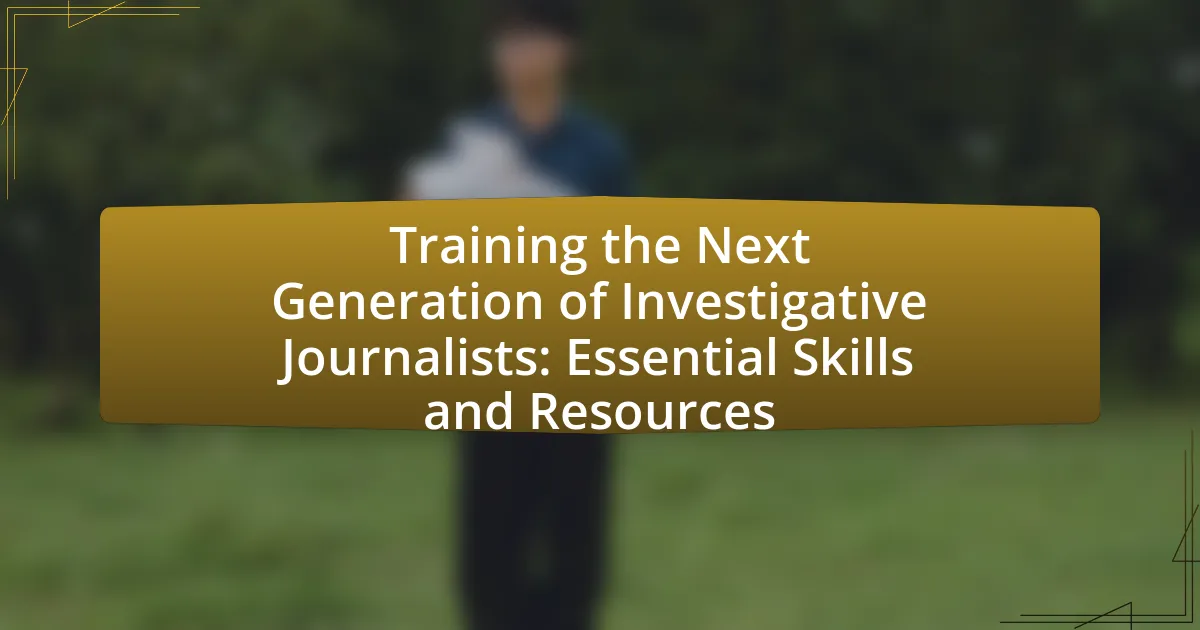The article focuses on the essential skills and resources necessary for training the next generation of investigative journalists. It outlines critical skills such as critical thinking, research proficiency, strong writing abilities, and ethical judgment, emphasizing their importance in effective reporting. The article also discusses techniques to enhance these skills, methods for conducting effective research, and the role of ethical decision-making in journalism. Additionally, it highlights various resources available for training, including journalism schools, online courses, and mentorship programs, while addressing common challenges faced by aspiring journalists and strategies for overcoming them.

What are the essential skills needed for investigative journalists?
The essential skills needed for investigative journalists include critical thinking, research proficiency, strong writing abilities, and ethical judgment. Critical thinking enables journalists to analyze complex information and discern credible sources. Research proficiency is vital for uncovering facts, utilizing databases, and conducting interviews effectively. Strong writing abilities ensure that findings are communicated clearly and compellingly, while ethical judgment guides journalists in navigating sensitive issues and maintaining integrity. These skills are supported by industry standards, such as those outlined by the Society of Professional Journalists, which emphasize accuracy, fairness, and accountability in reporting.
How do critical thinking and analytical skills contribute to investigative journalism?
Critical thinking and analytical skills are essential for investigative journalism as they enable journalists to evaluate information critically and draw logical conclusions. These skills allow journalists to assess the credibility of sources, identify biases, and uncover underlying truths in complex situations. For instance, a study by the Pew Research Center found that journalists who employ critical thinking are more effective in distinguishing between fact and misinformation, which is crucial in today’s media landscape. Additionally, analytical skills help journalists synthesize large amounts of data, facilitating the identification of patterns and trends that can lead to significant investigative stories.
What techniques can enhance critical thinking in journalism?
Techniques that can enhance critical thinking in journalism include the Socratic method, data analysis, and interdisciplinary approaches. The Socratic method encourages journalists to ask probing questions, fostering deeper understanding and challenging assumptions. Data analysis equips journalists with the skills to interpret statistics and trends, enabling them to support their narratives with concrete evidence. Interdisciplinary approaches, which integrate insights from various fields such as psychology, sociology, and ethics, help journalists to view issues from multiple perspectives, enhancing their analytical capabilities. These techniques collectively promote a more rigorous and thoughtful approach to journalism, ultimately leading to more informed reporting.
How does analytical thinking improve story development?
Analytical thinking enhances story development by enabling journalists to critically evaluate information, identify patterns, and construct coherent narratives. This cognitive process allows for the dissection of complex issues, ensuring that stories are not only factually accurate but also contextually rich. For instance, investigative journalists often sift through vast amounts of data and sources; analytical thinking aids in discerning which elements are most relevant to the story’s core message. Research indicates that strong analytical skills correlate with improved problem-solving abilities, which are essential in uncovering hidden truths and presenting them effectively to the audience.
Why is research proficiency vital for investigative journalists?
Research proficiency is vital for investigative journalists because it enables them to uncover accurate information, verify facts, and build credible narratives. This skill allows journalists to navigate complex data, access public records, and utilize various databases effectively, which is essential for exposing corruption, fraud, and other societal issues. For instance, a study by the Pew Research Center found that 63% of Americans believe that investigative journalism is crucial for holding powerful entities accountable, highlighting the importance of thorough research in producing impactful stories.
What methods can journalists use to conduct effective research?
Journalists can conduct effective research by utilizing a combination of primary and secondary sources, interviews, data analysis, and online databases. Primary sources, such as firsthand accounts and official documents, provide direct evidence, while secondary sources, including books and articles, offer context and background information. Interviews with experts and witnesses can yield unique insights and perspectives. Data analysis, including statistical evaluation and trend identification, enhances the depth of reporting. Online databases, such as government records and academic journals, facilitate access to credible information. These methods collectively ensure comprehensive and accurate reporting, essential for investigative journalism.
How can journalists verify the credibility of their sources?
Journalists can verify the credibility of their sources by cross-referencing information with multiple reliable outlets and checking the background and expertise of the source. This process involves assessing the source’s track record, understanding their motivations, and confirming their claims through independent verification. For instance, a study by the Pew Research Center indicates that journalists who utilize fact-checking resources and corroborate information from diverse, reputable sources are more likely to produce accurate reporting.
What role does ethical decision-making play in investigative journalism?
Ethical decision-making is crucial in investigative journalism as it guides journalists in balancing the public’s right to know with the potential harm that could arise from their reporting. This decision-making process ensures that journalists adhere to principles such as accuracy, fairness, and accountability, which are essential for maintaining credibility and trust with their audience. For instance, the Society of Professional Journalists emphasizes the importance of minimizing harm and acting independently, which reflects the ethical standards that investigative journalists must uphold to protect sources and sensitive information while pursuing the truth.
How can journalists navigate ethical dilemmas in their work?
Journalists can navigate ethical dilemmas by adhering to established ethical guidelines, engaging in continuous education, and fostering open discussions about ethical challenges. Adhering to guidelines such as the Society of Professional Journalists’ Code of Ethics provides a framework for decision-making, emphasizing principles like accuracy, fairness, and accountability. Continuous education through workshops and seminars helps journalists stay informed about evolving ethical standards and best practices. Furthermore, fostering open discussions within newsrooms encourages collaboration and diverse perspectives, allowing journalists to address ethical dilemmas collectively. This approach is supported by research indicating that ethical training and dialogue significantly enhance journalists’ ability to handle complex situations effectively.
What guidelines should journalists follow to maintain integrity?
Journalists should adhere to guidelines that emphasize accuracy, fairness, and transparency to maintain integrity. These guidelines include verifying information before publication, providing balanced perspectives, and disclosing conflicts of interest. For instance, the Society of Professional Journalists’ Code of Ethics states that journalists must seek truth and report it, which reinforces the importance of accuracy and accountability in their work. Furthermore, maintaining transparency with sources and methods fosters trust with the audience, essential for credible journalism.

What resources are available for training future investigative journalists?
Resources available for training future investigative journalists include journalism schools, online courses, workshops, and mentorship programs. Journalism schools, such as Columbia University and Northwestern University, offer specialized programs focusing on investigative reporting techniques. Online platforms like Coursera and edX provide courses on investigative journalism, often created by reputable institutions. Workshops conducted by organizations like the Investigative Reporters and Editors (IRE) offer hands-on training and networking opportunities. Additionally, mentorship programs connect aspiring journalists with experienced professionals, facilitating knowledge transfer and skill development. These resources collectively enhance the capabilities of future investigative journalists, equipping them with essential skills for effective reporting.
How can educational institutions support the development of investigative journalism skills?
Educational institutions can support the development of investigative journalism skills by integrating practical training, mentorship programs, and interdisciplinary coursework into their curricula. Practical training, such as hands-on reporting projects and simulations, allows students to apply investigative techniques in real-world scenarios, enhancing their critical thinking and problem-solving abilities. Mentorship programs connect students with experienced journalists, providing guidance and industry insights that are crucial for developing a professional network and understanding the nuances of investigative work. Additionally, interdisciplinary coursework that includes subjects like law, ethics, and data analysis equips students with the diverse skill set necessary for effective investigative journalism. Research indicates that programs incorporating these elements produce graduates who are better prepared for the challenges of the field, as evidenced by increased job placement rates and positive feedback from industry professionals.
What programs or courses are specifically designed for investigative journalism?
Programs specifically designed for investigative journalism include the Investigative Journalism Program at Columbia University, the Investigative Reporting Workshop at American University, and the Center for Investigative Reporting’s courses. These programs focus on developing skills in research, data analysis, and ethical reporting, essential for effective investigative journalism. For instance, Columbia’s program emphasizes hands-on experience and collaboration with professional journalists, while the Investigative Reporting Workshop provides students with opportunities to work on real-world investigative projects.
How do internships and hands-on experiences enhance learning?
Internships and hands-on experiences enhance learning by providing practical application of theoretical knowledge, which solidifies understanding and retention. Engaging in real-world tasks allows individuals to develop critical skills such as problem-solving, communication, and teamwork, which are essential in investigative journalism. Research indicates that students who participate in internships report higher levels of job readiness and confidence in their abilities, with a study by the National Association of Colleges and Employers showing that 70% of employers prefer candidates with internship experience. This direct exposure to the field fosters a deeper comprehension of industry standards and practices, ultimately preparing individuals for successful careers.
What role do professional organizations play in training journalists?
Professional organizations play a crucial role in training journalists by providing resources, networking opportunities, and professional development programs. These organizations, such as the Society of Professional Journalists and the National Press Club, offer workshops, seminars, and certifications that enhance journalists’ skills in areas like investigative reporting, ethics, and multimedia storytelling. For instance, the American Society of News Editors provides training that focuses on leadership and innovation in journalism, which is essential for adapting to the evolving media landscape. Additionally, these organizations often facilitate mentorship programs that connect emerging journalists with experienced professionals, fostering knowledge transfer and skill development.
Which organizations offer workshops and resources for investigative journalists?
Organizations that offer workshops and resources for investigative journalists include the International Consortium of Investigative Journalists (ICIJ), the Center for Investigative Reporting (CIR), and the Investigative Reporters and Editors (IRE). ICIJ provides training and resources for cross-border investigative journalism, CIR offers workshops focused on multimedia storytelling, and IRE conducts training sessions and provides a wealth of resources for investigative reporting techniques. These organizations are recognized for their contributions to enhancing the skills and resources available to investigative journalists globally.
How can networking with professionals benefit aspiring journalists?
Networking with professionals benefits aspiring journalists by providing access to mentorship, job opportunities, and industry insights. Establishing connections with experienced journalists can lead to guidance on skill development and career paths, as well as potential job referrals. According to a survey by the American Society of News Editors, 70% of journalists reported that networking played a crucial role in their career advancement. This demonstrates that building relationships within the industry can significantly enhance an aspiring journalist’s prospects and understanding of the field.

What are the best practices for mentoring the next generation of investigative journalists?
The best practices for mentoring the next generation of investigative journalists include fostering critical thinking, encouraging ethical reporting, and providing hands-on experience. Mentors should guide mentees in developing analytical skills to assess information critically, which is essential for investigative work. Ethical reporting practices must be emphasized, as integrity is crucial in journalism; this includes understanding the importance of fact-checking and respecting sources. Additionally, providing practical experience through internships or real-world projects allows mentees to apply their skills in a professional context, enhancing their learning and confidence. Research indicates that mentorship programs that incorporate these elements significantly improve the preparedness and effectiveness of emerging journalists in the field.
How can experienced journalists effectively mentor newcomers in the field?
Experienced journalists can effectively mentor newcomers by providing hands-on training, sharing industry insights, and fostering critical thinking skills. This mentorship involves guiding newcomers through real-world reporting scenarios, which enhances their practical skills and confidence. Additionally, experienced journalists can share their own experiences, including successes and failures, to illustrate the complexities of the field. Research indicates that mentorship programs significantly improve the professional development of new journalists, as evidenced by a study from the Pew Research Center, which found that 70% of mentees reported increased job satisfaction and skill enhancement. By actively engaging in the learning process, experienced journalists can ensure that newcomers are well-equipped to navigate the challenges of investigative journalism.
What strategies can mentors use to provide constructive feedback?
Mentors can use specific strategies to provide constructive feedback, including the use of the “sandwich” method, which involves starting with positive comments, followed by areas for improvement, and concluding with encouragement. This approach helps to create a supportive environment that fosters growth. Additionally, mentors should focus on specific behaviors rather than personal attributes, ensuring that feedback is actionable and relevant. Research indicates that feedback is most effective when it is timely and delivered in a manner that encourages dialogue, allowing mentees to ask questions and clarify their understanding. For instance, a study published in the Journal of Educational Psychology found that feedback that includes specific examples and suggestions for improvement leads to better performance outcomes in learners.
How can mentors help mentees develop their unique journalistic voice?
Mentors can help mentees develop their unique journalistic voice by providing personalized feedback and guidance tailored to the mentee’s interests and strengths. This process involves regular discussions about the mentee’s writing style, content choices, and ethical considerations in journalism. For instance, mentors can analyze the mentee’s articles, highlighting areas where their voice shines and suggesting improvements to enhance authenticity. Research indicates that mentorship significantly boosts confidence and skill development in emerging journalists, as seen in studies conducted by the American Press Institute, which found that mentorship programs lead to higher job satisfaction and improved writing quality among participants.
What common challenges do aspiring investigative journalists face?
Aspiring investigative journalists face several common challenges, including limited access to resources, legal risks, and the need for strong ethical standards. Limited access to resources can hinder their ability to conduct thorough research and gather information, as many may lack funding or institutional support. Legal risks arise from potential lawsuits or threats from powerful entities that may seek to silence their inquiries, making it crucial for journalists to understand media law and their rights. Additionally, maintaining strong ethical standards is essential, as they must navigate the complexities of truth-telling while respecting privacy and avoiding conflicts of interest. These challenges are documented in various studies, such as the “State of Investigative Journalism” report by the Center for Media Engagement, which highlights the difficulties faced by journalists in the current media landscape.
How can mentors assist in overcoming these challenges?
Mentors can assist in overcoming challenges faced by aspiring investigative journalists by providing guidance, sharing industry knowledge, and offering constructive feedback. This support helps mentees navigate complex ethical dilemmas, develop critical thinking skills, and enhance their reporting techniques. For instance, mentors can share real-world experiences that illustrate best practices in investigative journalism, which can significantly reduce the learning curve for newcomers. Additionally, studies show that mentorship programs improve retention rates in journalism careers, indicating that effective mentorship can lead to greater confidence and competence among emerging journalists.
What resources can be recommended to help new journalists succeed?
New journalists can succeed by utilizing resources such as journalism schools, online courses, mentorship programs, and professional organizations. Journalism schools like Columbia University and Northwestern University offer comprehensive programs that equip students with essential skills. Online platforms such as Coursera and edX provide courses on investigative journalism, ethics, and multimedia storytelling, allowing flexible learning. Mentorship programs, like those offered by the Poynter Institute, connect new journalists with experienced professionals for guidance and support. Additionally, joining organizations such as the Society of Professional Journalists provides access to networking opportunities, workshops, and industry resources that enhance professional development.
What practical tips can enhance the training of future investigative journalists?
Practical tips that can enhance the training of future investigative journalists include fostering critical thinking skills, encouraging hands-on experience, and promoting ethical standards. Critical thinking enables journalists to analyze information effectively, discern credible sources, and construct compelling narratives. Hands-on experience, such as internships or real-world reporting projects, allows aspiring journalists to apply theoretical knowledge in practical settings, enhancing their skills and confidence. Promoting ethical standards ensures that future journalists understand the importance of integrity, accuracy, and accountability in their work, which is essential for maintaining public trust. These approaches are supported by educational frameworks that emphasize experiential learning and ethical journalism practices, which have been shown to improve the quality of reporting and the preparedness of journalism graduates for the field.

Leave a Reply